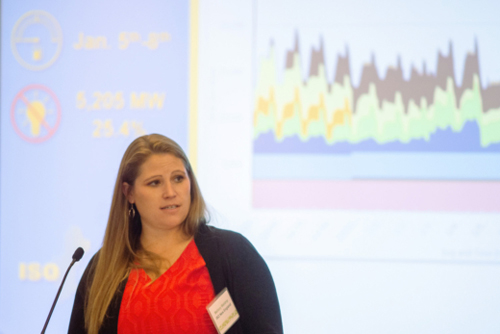New England state and grid officials are refining their plans to use conservation pleas in the case of an energy emergency, buoyed by the success of California’s call to action during this summer’s heatwave.
ISO-NE hasn’t had to employ a conservation request since 2013, when a July heatwave led it to ask energy consumers to raise their AC temperatures, turn off lights and appliances, and defer chores like laundry.
But increasing worries about winter resource adequacy in the case of extended cold weather has ISO-NE thinking about the next time it might have to ask New Englanders to voluntarily cut back, and what might be different this time.
At a regional tabletop exercise that the grid operator organized earlier this month, communication with the public about its ability to help was a central topic, said Matt Kakley, spokesperson for ISO-NE.
 ISO-NE’s lead energy security analyst Mallory Waldrip speaks at a regional tabletop exercise. | ISO-NE
ISO-NE’s lead energy security analyst Mallory Waldrip speaks at a regional tabletop exercise. | ISO-NE“A lot of what we talked about in the tabletop and in our standard emergency planning and discussions is how do we coordinate those messages? How do we make sure that everyone from the ISO to the utilities to the government folks is in the loop on things and understand what’s going on and what the ask is?” Kakley said.
ISO-NE would be the entity that would make the decision to call for energy conservation, based on its near- and medium-term forecasts.
But with its limited reach, the grid operator would rely on help from state governments and utilities (which already have customers’ email addresses and phone numbers) to get the message out.
“Close coordination with stakeholders such as our regional grid operator, emergency management officials and our fellow utilities among others is fundamental to any emergency response, and participation in regional trainings and exercises helps us to be ready in the event ISO-NE must take emergency action,” said William Hinkle, an Eversource spokesperson.
Learning from California’s Success?
Policymakers in New England see California’s recent experience as a strong example of the power of conservation.
The state’s urgent text to residents shortly before a period of impending record electricity demand, coordinated by the Governor’s Office of Emergency Services, was widely hailed as a successful, if drastic, step to stave off potential rolling blackouts. (See California Runs on Fumes but Avoids Blackouts.)
CAISO saw demand drop by 2,000 MW just 20 to 30 minutes after the text went out.
To ISO-NE, it was “comforting,” said Kakley.
“They were able to keep demand under the level they were able to serve, and not have to resort to the extreme measure of controlled power outages,” he said. “What that really drove home, what we’ve always known, but seeing it in a real-world example, was that if you ask the public to do something, and you’re clear in what you’re asking to do, they will respond.”
New England state officials have called for the region to employ that sort of call to action if needed.
June Tierney, commissioner of the Vermont Department of Public Service, made that point at the FERC forum in Burlington, Vermont, last month.
“Let’s not underestimate the people of the United States, she said. “Let’s not underestimate the people of New England. If they’re called upon, as millions of Californians were on their cell phones, to reduce demand immediately, they will respond.”
But ISO-NE has also acknowledged that the scenario presented in an energy emergency in the New England winter takes on a different shape: Rather than a capacity crisis lasting just a couple hours, it could be a fuel shortage that lasts as long as multiple days.
It’s a nightmare possibility that the region has been wrestling with for years, with increasing anxiety each winter, as the region continues to rely on volatile LNG markets.
“We spent a lot of time talking about how that call for conservation would be different,” Kakley said. “It’s a different kind of request and one that people haven’t spent a lot of time thinking about. We’re realizing that our messaging needs to be very clear.”



